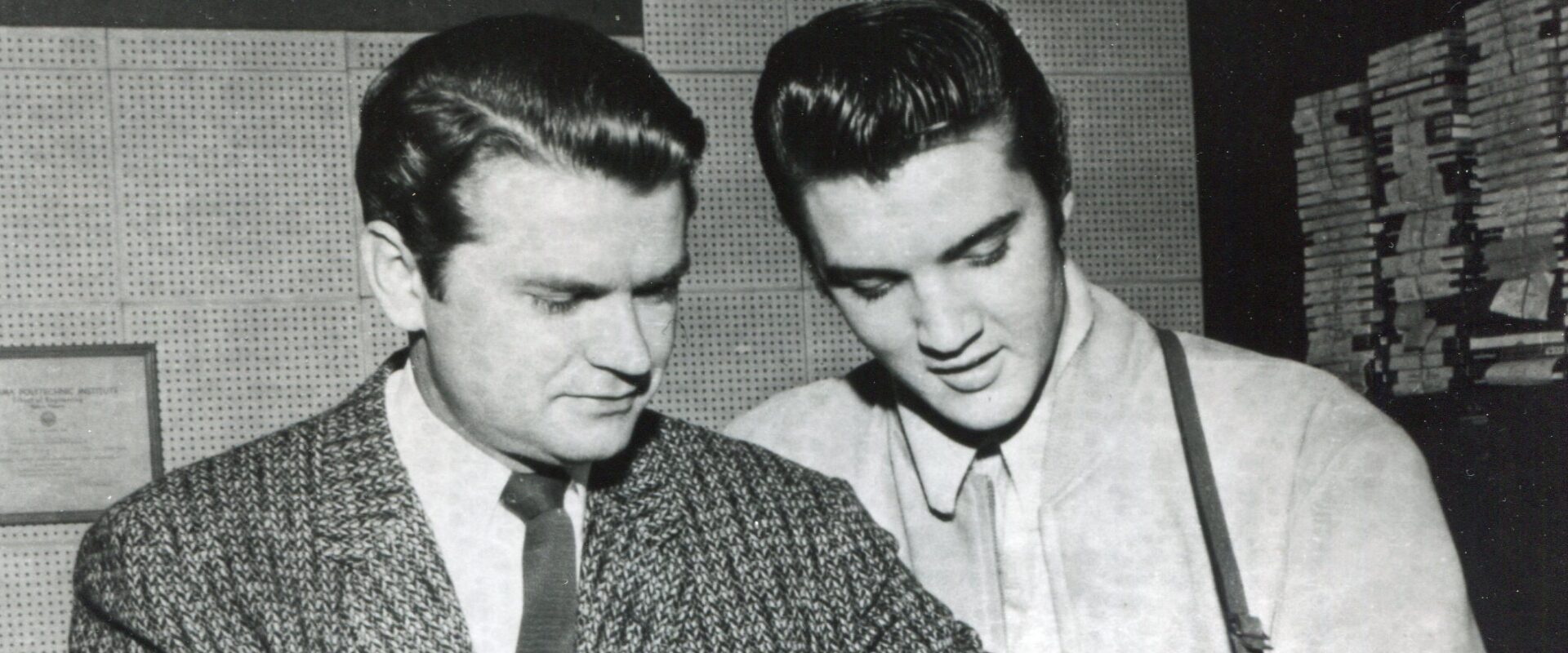If Elvis Presley was the King of Rock & Roll, Sam Phillips was the Grand Duke who brought Presley to lip-curling rule.
Phillips, an Alabama-born visionary, founded the famous Sun Records. A cultural-shifting revolutionary, he discovered and recorded Presley, Johnny Cash, B.B. King, Jerry Lee Lewis, Carl Perkins, Roy Orbison, and more. He helped bust racial barriers and launched a musical tidal wave from the heart of Memphis, which, nearly 75 years later, is still widely considered the Birthplace of Rock & Roll.
Phillips died 22 years ago today (July 30) of respiratory failure at St. Francis Hospital in Memphis. He passed just one day before the original Sun Studio was designated a National Historic Landmark. Phillips was 80. He is interred in the Memorial Park Cemetery in Memphis.
“I knew what I opened the studio for,” Phillips told the Los Angeles Times. “I was looking for a higher ground, for what I knew existed in the soul of mankind. And especially at that time, the black man’s spirit and his (soul).”
Sam Phillips Found Elvis Presley, Johnny Cash, and B.B. King
Phillips was born in Florence, Alabama, on January 5, 1923. According to the Alabama Music Hall of Fame, which inducted him in 1987, Phillips grew up surrounded by music. The voices of sharecroppers filled the air. He heard gospel music from Black churches and country music on the radio. From the time he was a child, he was captivated by the convergence of the styles. As an adult, he created a space that would become his legacy.
Phillips first visited Memphis in 1939, and the vibrance of Beale Street changed his dreams and his destiny. In the 1940s, Phillips began his career as a radio DJ and sound engineer for stations including WLAY in Muscle Shoals and later WREC in Memphis. Working with a playlist of both white and black artists helped mold his creative vision.
In October 1949, Phillips leased an old auto glass repair shop at 706 Union Avenue in Memphis. He meticulously renovated the space, striving to perfect its echo, thus paving the way for the Memphis Recording Service to open on January 3, 1950.
Phillips’ Motto: “We Record Anything‑Anywhere‑Anytime”
Memphis Recording Service became Sun Records a few years later. To keep it open in the early days, Phillips recorded everything from wedding speeches to school events. But his goal remained to record blues and gospel artists from Beale Street before it was too late.
“I think I was conscious of letting out the insides, emotional insides, of people,” he told Morning Edition host Bob Edwards in 1993. “And that was the challenge, to a great extent. Oh man, I loved the music. I dearly loved it. So this was a beautiful experience — it still is, to see the influence that it’s had around the world.”
His venture began as a rhythm and blues label to give black musicians a place to record without having to travel to Chicago.
“People at that time, and no disrespect for any human being on this Earth, but people didn’t look upon this as real artistry,” Phillips told Morning Edition.
Blues legends like B.B. King and Howlin’ Wolf made their early recordings at Phillips’ studio. He even recorded what some music historians consider the first rock and roll song, “Rocket 88,” for the Kings of Rhythm. According to Graceland, Sun Studio went on to make more rock and roll music than any other label at the time — 226 singles during its 16-year run.
Breaking Racial Barriers
Phillips is widely credited with helping break racial barriers in music by successfully blending country and R&B in a way that resonated across the races. His country-blues mix gave way to rockabilly. He wanted a mood to be established as soon as a song began, and then for it to ignite.
Peter Guralnick, Phillips’s biographer, quoted Phillips as saying: “If I could find a white man who had the Negro sound and the Negro feel, I could make a billion dollars.”
He produced Presley’s first record, the 1954 single that featured “That’s All Right, Mama” and “Blue Moon of Kentucky.”
“God only knows that we didn’t know it would have the response that it would have,” Phillips said in 1997. “But I always knew that the rebellion of young people, which is as natural as breathing, would be a part of that breakthrough.”
Rock and Roll Hall of Fame and Country Music Hall of Fame
Phillips was inducted into the Rock and Roll Hall of Fame in 1986 (as the first non-performer), the Blues Hall of Fame, and the Country Music Hall of Fame, and was recognized with a Grammy Trustees Lifetime Achievement Award.
“I have one real gift and that gift is to look another person in the eye and be able to tell if he has anything to contribute,” Phillips told journalist David Halberstam. “If he does, I have the additional gift to free him from whatever is restraining him.”
(Photo by Michael Ochs Archives/Getty Images)
